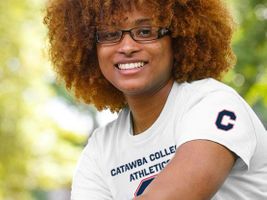By Susan Shinn, Catawba College News Service
What do mathematics, alternative rock, bats and the N.C. Transportation Museum all have in common?
Students at Catawba College had summer internships related to these topics.
Four students shared their experiences in a colloquium Oct. 29 in Ketner Hall.
Making presentations were senior Kyle Ganow and juniors Cindy Cook, Lisa Easter and Merrissa Kuylen.
Cook and Ganow found their internships through REUs — Research Experiences for Undergraduates, sponsored by the National Science Foundations. Easter and Kuylen attained their internships the old-fashioned way — through persistent networking.
The students were given 10 minutes to deliver their presentations.
A history major, Kuylen has been infatuated with the subject since eighth grade. She said that her mother dragged her to "millions of museums" on a trip to Ireland, and it was there that a particular exhibit caught her fancy.
Kuylen contacted Margaret Faust in alumni relations, who put her in touch with Brian Moffitt at the N.C. Transportation Museum. Moffitt offered her an internship.
"It took history to a whole different level for me," she said.
Kuylen gave tours to everyone from seniors groups to Cub Scouts.
She worked with teletype operators of Piedmont Airlines as part of the museum's oral history project.
She plans to attend graduate school in museum science.
"This summer brought my education to a whole new level," Kuylen said. "It's what we hope to do at a liberal arts college."
A math major, Cook spent her summer at the University of North Carolina at Asheville, where she participated in "Math in the Mountains," one of the many REU opportunities.
Cook was one of eight students who studied "Groups, Graphs and Geometry" during June and July.
"I knew nothing about graph research," Cook said, "but I knew I could not spend my summer in a dark theater shoveling popcorn."
Dr. Patrick Bahls, her advisor, picked her up at the airport. She noticed he had a tattoo of pi on his arm and she wondered, "What have I gotten myself into?"
What she ended up doing was working 40 hours a week in local coffee shops, studying graph theory and attempting to prove theorems. Specifically, she studied random graphs created by the Use It or Lose It tree. She used the Markov Theory to find the expected diameter of these graphics.
To do so, she analyzed thousands and thousands of graphs over the course of the summer.
"It is really, really exciting," she said. "I learned so much."
Cook discovered the research side of math and how to "speak math."
The internship, she said, opened her eyes to the world of math beyond Catawba.
Meanwhile, Lisa Easter was attempting to become a rock star.
Well, sort of.
Easter landed an internship with Hopeless Records, an alternative music label, based in her home state of California.
"I woke up happy every day because I loved my job," Easter said.
But she was determined to become a part of the Warped Tour, alternative music’s summer festival.
She started driving from location to location, using every contact she could, until she became the "merch girl" for Attack Attack, a hardcore electronic band.
"I lived on a bus with 11 guys for two months," she said.
She was up at 7:30 a.m., setting up the tent and table, doing a job guys typically do.
"I could not have asked for a better summer," she said. "I learned that I don’t just have to be a singer."
The music business major, who will graduate a year early, is considering being a tour manager or booking agent.
Ganow, a biology and Spanish major, spent his summer studying the activity of bats around Palo Duro Canyon in the Texas Panhandle.
Ganow worked through West Texas A&M University, again through an REU. Texas leads the nation in installed wind energy capacity, but because of dependence on the canyon for roosting sites in the panhandle area, some species of bats could be affected by the wind farms.
Ganow spent 37 nights tracking bat calls in Palo Duro Canyon State Park, as the bats flew from the habitats to feed. He was the only undergraduate in the researchers' group.
Some bats fly farther than others, but there was a three-fold difference, with more calls in the canyon area, versus the short grass plain area known as the Llano Estacado.
"There's been little work done on the panhandle on bats," Ganow said. "This knowledge can be used to make decisions on wind farm sitings."
He added, "It was a really great opportunity and I loved every minute of it out there."
Dr. Sharon Sullivan, an associate professor of mathematics, hosted the colloquium, and noted that a second event was being planned for spring. Students who would like to participate may contact Sullivan at slsulliv@catawba.edu.
Freelance writer Susan Shinn is a full-time student at Catawba College.
RELATED CONTENT:
Catawba Student among Alpha Chi Convention Presentation Prize Winners
